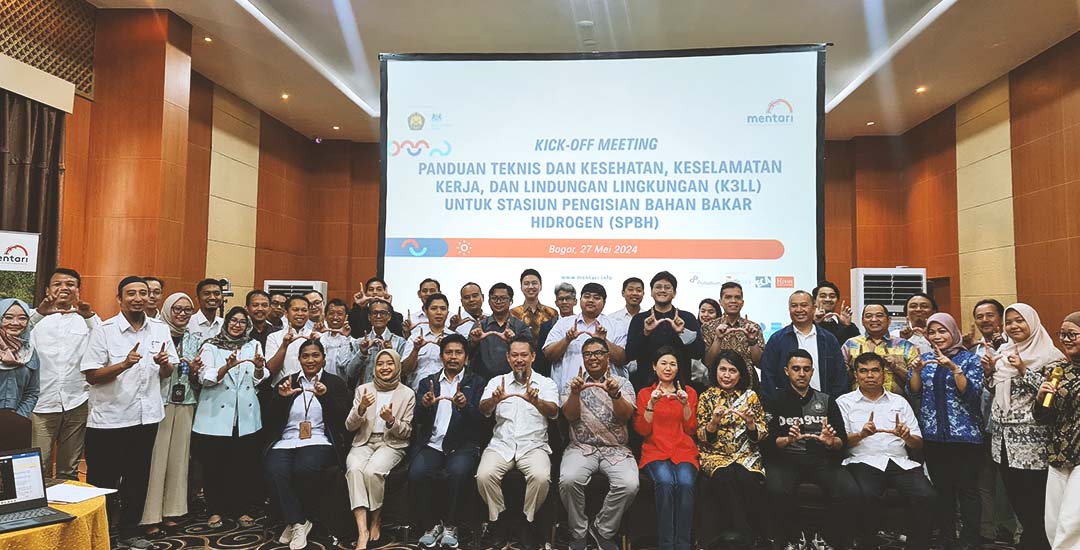
Envidata’s Expert Team Joined the Discussion on the Preparation of Technical Guidelines and Occupational Health, Safety, and Environmental Protection (K3LL) for Hydrogen Refueling Stations.
EnvidataID, Bogor – On May 27, 2024, several expert teams from PT Envidata Inovasi Indonesia participated in the Kick-Off Meeting for the Technical Guidelines and Occupational Health, Safety, and Environmental Protection (K3LL) for Hydrogen Fueling Stations. On this occasion, various institutions committed to promoting green energy for the future have gathered, including the Directorate General of New Renewable Energy and Energy Conservation (EBTKE), the Directorate of Oil and Gas Engineering and Environment, the Center for New Renewable Energy and Energy Conservation Testing and Survey (BBSP KEBTKE), the Center for Oil and Gas Testing (LEMIGAS), the Ministry of Transportation of the Republic of Indonesia, the Ministry of Environment and Forestry, the Ministry of Public Works and Public Housing (PUPR), Komtek 27 – 11 Hydrogen Technology, Pertamina Group, PLN Group, Hyundai, Toyota, RINA Indonesia, Indonesia Fuel Cell and Hydrogen Energy (IFHE), the Indonesian Automotive Industry Association (Gaikindo), and UK Mentari. The representatives of the expert team from PT Envidata Inovasi Indonesia who are active in this meeting include Arief Marsudi Harjo, S.Kel, M.Si, and Pristi Sukmasetya, S.Kom., M.Kom.
The purpose of this meeting forum is to gain insights, input, and opinions from various stakeholders regarding the development of a more comprehensive HSE (Health, Safety, and Environment) guideline for Hydrogen Fueling Stations. In addition, it is equally important to discuss the licensing mechanism for the operation of Hydrogen Fueling Stations. (SPBH). A guide certainly takes into account many aspects, including K3LL procedures from pre-construction to SPBH operational stages, the determination of risk analysis methods, specifically the quantitative method using HyRam, and the necessity for clear regulations and licensing processes so that SPBH can operate in accordance with safety protocols.
As information related to SPBH, the Directorate General of Oil and Gas has issued Minister of Energy and Mineral Resources Regulation No. 32 of 2021 concerning Technical Inspections and Safety Checks of Installations and Equipment in Oil and Natural Gas Business Activities, as well as the Decision of the Director General of Oil and Gas No. 409 of 2023 regarding the Guidelines for Gas Stations, which can serve as a reference for installation and inspection guidelines for SPBH.
The Decision of the Director General of Oil and Gas Number 409 of 2023 is a very important technical guideline in the oil and gas industry, especially for business actors in the field of Public Fuel Filling Stations (SPBU). This decision provides clear guidance on the safety, technical, and operational aspects that must be met by each SPBU. Although this decision is specifically aimed at SPBUs, many of the principles and requirements outlined in it can serve as an excellent reference for Animal Fuel Filling Stations. (SPBH). This is due to:
- Fuel Similarities: Both gas stations and fuel depots deal with flammable materials. Therefore, the safety requirements applicable to gas stations are also relevant to be implemented at fuel depots.
- Equipment Installation: Many of the tools used in gas stations and fuel distribution stations have similar functions, such as nozzles, hoses, and storage tanks. The technical standards applicable to gas stations can serve as a reference in the selection and installation of equipment in fuel distribution stations.
- Operational Procedure: The fuel filling procedure has several similarities. The safety principles outlined in the Director General of Oil and Gas Decision can serve as a guideline in developing safe operational procedures at SPBH.
Basically, hydrogen is the simplest and most abundant element in the universe, increasingly attracting attention as a promising alternative energy source. The advantages of hydrogen fuel include, among others,
- Zero Emission: When used in fuel cells, hydrogen only produces water as a byproduct. This makes it a very clean and environmentally friendly fuel.
- High Efficiency: The conversion of hydrogen energy into electricity is very efficient, much higher than the combustion of fossil fuels.
- Should Be Produced from Various Sources: Hydrogen can be produced from a variety of sources, including water, natural gas, and biomass. This provides flexibility in its production.
- Can Be Stored: Hydrogen can be stored in various forms, such as gas, liquid, or in solid form.
Indonesia has great potential in hydrogen energy development. With abundant natural resources such as sunlight, wind, and water, Indonesia can produce hydrogen sustainably. Several hydrogen energy development initiatives have been undertaken in Indonesia, but there is still a need for further improvement.
Hydrogen fuel offers great hope as a clean and efficient energy source for the future. Although there are still challenges to overcome, the potential benefits are significant. With the right investments and supportive policies, hydrogen could play an important role in the energy transition towards a more sustainable future.
Sumber: www.envidata.id

